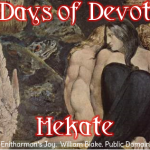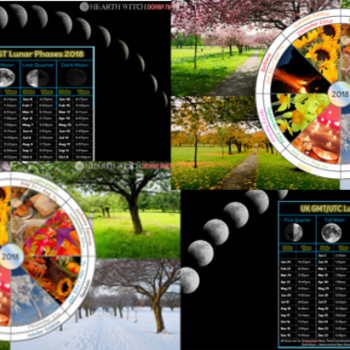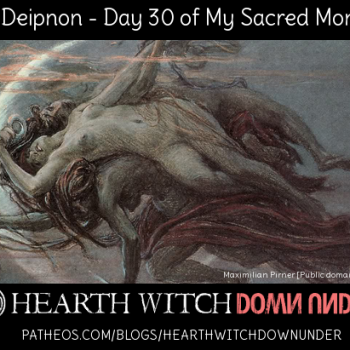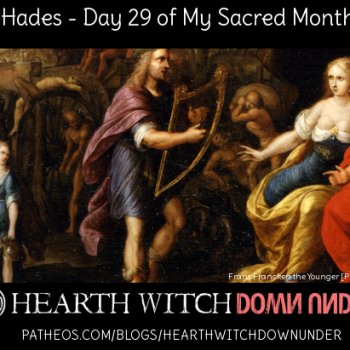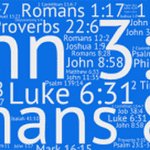This post is part of a blog challenge series – 30 Days of Devotion, to Hekate. Day 5 and we are looking Hekates family tree and genealogy.
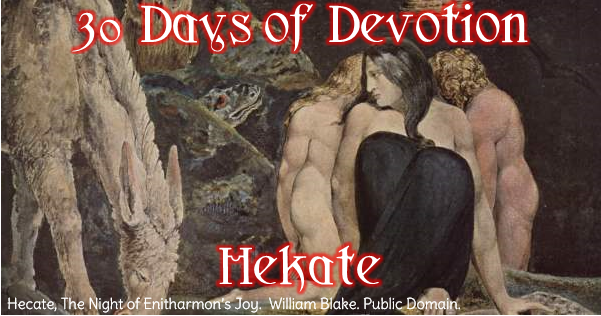
Today we are looking at family and genealogical connections to Hekate. Being Greek religion we’re talking about here, it’s not so simple as just listing the family members, because depending on what you’re reading, the family members change.
Parentage
Most commonly we see that Hekate is the daughter, indeed only child, of the Titans Perses, The Destroyer and Asteria, the Starry One. Sometimes Nyx is named as the mother of Hekate, but it is generally assumed this is actually a reference to Asteria, since both are the of the night.
Occasionally She is named as the daughter of Zeus, or Demeter, or Aristaeus – but Aristaeus is also considered to be Asteria in this particular case.
As the daughter of Perses and Asteria, She is thus the grand-daughter of Krios & Eurybia and Koios & Phoibe, and then the great grand-daughter of Ouranus, Gaia and Pontos.
In that much loved book of mine, the Larousse Encyclopaedia of Mythology there is also mention of Hekate being the daughter of Zeus and Hera. Accordingly, She stole some rouge from Hera to give to Europa and when Hera found out, well, angry mum. Hekate ran away and hid in a human home, but the woman there was giving birth and this made Hekate unclean. To cleanse Herself She had the Cabeiri dip Her into the river Acheron in the Underworld and this is how Hekate became a Goddess of the Underworld.
Now being an encyclopaedia, I have no idea where that story comes from, so I can’t say if it is actually historical or not (Graves had a hand in the writing of that book after all). Either way, I must say, I personally prefer Hekate as the daughter of Perses and Asteria and that She became an Underworld Goddess via Her association with Persephone.
Lovers & Offspring
In most cases Hekate is considered a maiden Goddess – but this doesn’t necessarily mean She was a virgin, just that She remained without a consort. Though again, this isn’t always the case, sometimes She is said to be consorted with Hermes, and the two are often called on together for curses and spells and they have many things in common – not least the crossroads, magic and the dead.
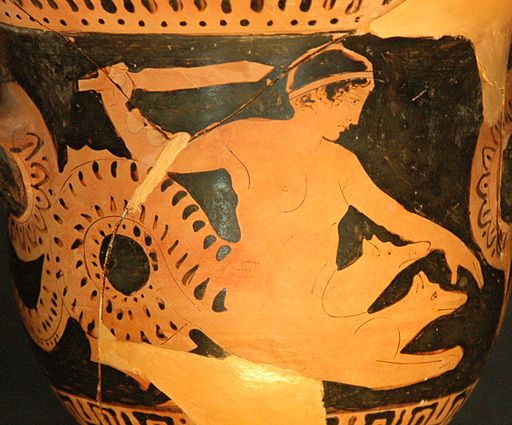
She is said in some myths to have been married, which is somewhat different to consorting, to Aeetes, king of Colchis. Via this marriage She is said to have borne Medea and Circe, the witches, sorceresses or Goddesses in their own right. She is also said to have borne a son, Aigialeus.
Via a conflation with Krataeis, Hekate is said to have mated with Phorcus and thus is the mother of the monster Scylla.
Some also name Hekate as the mother of the Lamiae and Empusae, who were either succubus like creatures or the ghosts of women.
As we can see, the family trees of the Theoi are kind of complicated, and Hekate truly has one of the more simple family lines when it comes right down to it.
30 Days of Deity Devotion
1 – A basic introduction of the deity
2 – How did you become first aware of this deity?
3 – Symbols and icons of this deity
4 – A favourite myth or myths of this deity
5 – Members of the family – genealogical connections
6 – Other related deities and entities associated with this deity
7 – Names and epithets
8 – Variations on this deity (aspects, regional forms, etc.)
9 & 27 – Common mistakes and worst misconceptions about this deity
10 – Offerings – historical and UPG
11 – Festivals, days, and times sacred to this deity
12 – Places associated with this deity and their worship
13 – What modern cultural issues are closest to this deity’s heart?
14 – Has worship of this deity changed in modern times?
15 – Any mundane practices that are associated with this deity?
16 – How do you think this deity represents the values of their pantheon and cultural origins?
17 – How does this deity relate to other gods and other pantheons?
18 – How does this deity stand in terms of gender and sexuality? (historical and/or UPG)
19 – What quality or qualities of this god do you most admire? And find the most troubling?
20 & 21 – Art and music that reminds you of this deity
22 – A quote, a poem, or piece of writing that you think this deity resonates strongly with
23 – Your own composition – a piece of writing about or for this deity
24 & 25 – A time when this deity has helped you, and refused to help
26 – How has your relationship with this deity changed over time?
28 – Something you wish you knew about this deity but don’t currently
29 – Any interesting or unusual UPG to share?
30 – Any suggestions for others just starting to learn about this deity?


